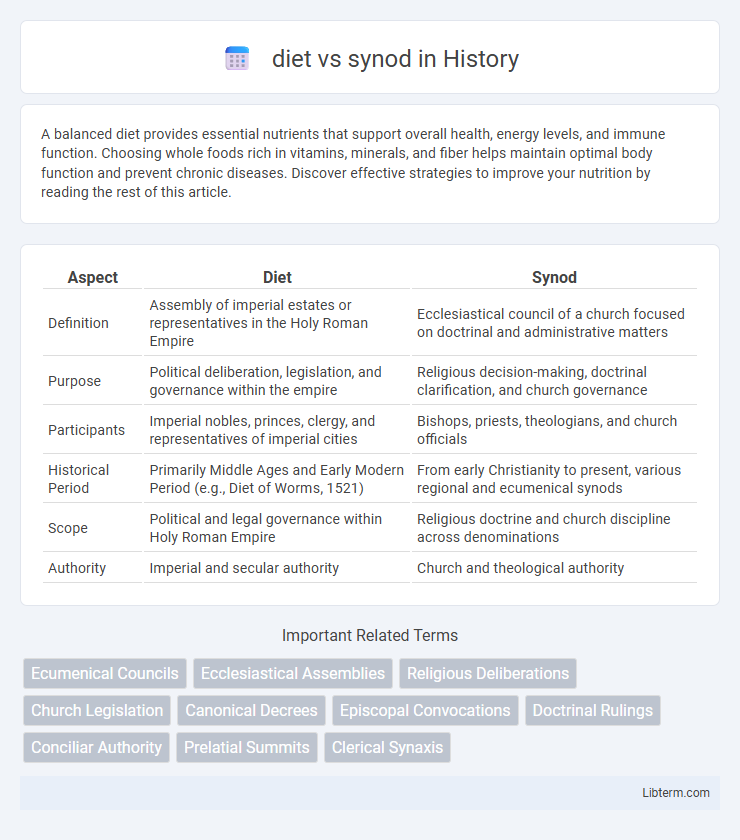A balanced diet provides essential nutrients that support overall health, energy levels, and immune function. Choosing whole foods rich in vitamins, minerals, and fiber helps maintain optimal body function and prevent chronic diseases. Discover effective strategies to improve your nutrition by reading the rest of this article.
Table of Comparison
| Aspect | Diet | Synod |
|---|---|---|
| Definition | Assembly of imperial estates or representatives in the Holy Roman Empire | Ecclesiastical council of a church focused on doctrinal and administrative matters |
| Purpose | Political deliberation, legislation, and governance within the empire | Religious decision-making, doctrinal clarification, and church governance |
| Participants | Imperial nobles, princes, clergy, and representatives of imperial cities | Bishops, priests, theologians, and church officials |
| Historical Period | Primarily Middle Ages and Early Modern Period (e.g., Diet of Worms, 1521) | From early Christianity to present, various regional and ecumenical synods |
| Scope | Political and legal governance within Holy Roman Empire | Religious doctrine and church discipline across denominations |
| Authority | Imperial and secular authority | Church and theological authority |
Understanding the Terms: Diet vs Synod
A diet refers to a formal deliberative assembly or legislative session, often used in historical or political contexts such as the Imperial Diet of the Holy Roman Empire. A synod, on the other hand, is a council or meeting of church officials convened to discuss ecclesiastical matters and doctrinal issues, typical within Christian denominations. Understanding the distinction lies in diet being primarily a secular or governmental term, while synod specifically pertains to religious governance and organizational decisions.
Historical Origins of Diets and Synods
Diets and synods originated in medieval Europe as formal assemblies with distinct purposes: diets served as political or imperial councils for rulers like the Holy Roman Emperor to deliberate on governance and territorial matters, while synods were ecclesiastical gatherings convened by church authorities to discuss doctrinal, disciplinary, and administrative issues. The term "diet" derives from the Latin "dietas," meaning daily assemblies, historically exemplified by the Imperial Diet of the Holy Roman Empire, notably the Diet of Worms in 1521. Synods trace back to early Christian history, evolving from regional church meetings into institutionalized processes shaping ecclesiastical law and church doctrine, fundamental to Christian religious governance.
Key Functions of a Diet
A Diet functions as a legislative assembly within certain historical and modern political contexts, primarily responsible for enacting laws, approving budgets, and overseeing government actions. Unlike a Synod, which focuses on ecclesiastical governance and doctrinal matters, a Diet addresses civil governance and policy-making. Key functions include debating and passing legislation, representing constituents, and ensuring executive accountability.
Primary Roles of a Synod
A synod serves as a council in various Christian denominations, primarily responsible for governing church doctrine, discipline, and administration. Unlike a diet, which historically refers to legislative assemblies or meetings in secular governance, a synod focuses on theological decision-making and ecclesiastical matters. Synods play a crucial role in defining church policies, resolving doctrinal disputes, and guiding liturgical practices within their jurisdictions.
Diets in Political Contexts
Diets in political contexts refer to formal legislative assemblies or deliberative bodies prevalent in historical and modern governance systems, such as the Imperial Diet of the Holy Roman Empire or the Japanese National Diet. These assemblies functioned as crucial platforms for enacting laws, debating policies, and representing various estates or regions within a state, distinguishing them from synods primarily concerned with ecclesiastical matters. The role of diets evolved to include state governance, fiscal oversight, and political negotiation, shaping constitutional developments and power distribution in monarchies and emerging parliamentary states.
Synods in Religious Governance
Synods serve as authoritative assemblies in religious governance, particularly within Christian denominations, where clergy and laity convene to discuss doctrine, discipline, and administrative matters. Unlike diets, which are primarily political legislative bodies in secular governments, synods focus on theological issues and church policies, shaping ecclesiastical law and community practices. The decisions made by synods impact religious teachings, pastoral approaches, and the organizational structure of the church.
Comparative Analysis: Diet vs Synod
A Diet is a formal legislative assembly or deliberative body often found in historical contexts like the Holy Roman Empire, whereas a Synod is a council or meeting primarily within Christian churches focused on ecclesiastical matters. The Diet typically addresses political, legal, and administrative issues involving state governance, whereas Synods concentrate on theological discussions, church discipline, and doctrinal decisions. Comparative analysis highlights that Diets function as secular governing assemblies, while Synods serve as religious governing bodies, reflecting differing scopes and purposes.
Notable Examples of Diets and Synods
The Diet of Worms (1521) is a notable example where Martin Luther defended his theses, marking a pivotal moment in the Protestant Reformation. The Council of Nicaea (325 AD), one of the most significant synods, established foundational Christian doctrines like the Nicene Creed. Both assemblies shaped religious history: diets as imperial or political gatherings influencing church-state relations, and synods as ecclesiastical councils defining theology and church discipline.
Influence on Modern Governance and Religion
The Diet, as a legislative assembly in medieval and early modern Europe, laid foundational principles for modern parliamentary governance by promoting representation and legal codification. In contrast, the Synod, predominantly a religious council, shaped ecclesiastical authority and doctrinal uniformity, influencing the organizational structures of contemporary religious institutions. Both entities contributed to governance and religious practices, with Diets impacting secular political systems and Synods reinforcing doctrinal governance within church hierarchies.
Conclusion: Distinguishing Diet from Synod
The term "Diet" refers to a formal assembly, often of a legislative or political nature, distinct from a "Synod," which is primarily a council of ecclesiastical leaders addressing church doctrine and governance. Diets typically involve secular authorities and wider political matters, whereas synods focus exclusively on religious and theological issues. Understanding this distinction is crucial for accurate historical and contextual analysis of medieval and early modern assemblies.
diet Infographic

 libterm.com
libterm.com